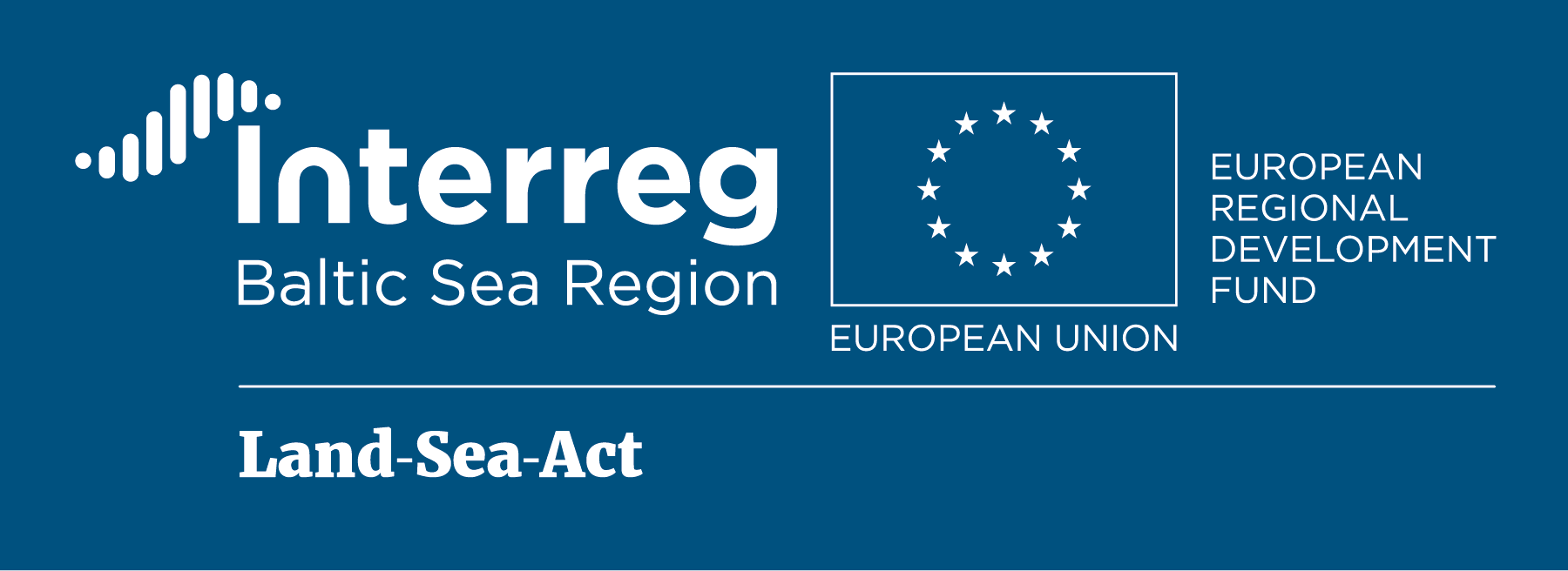Project implementation duration: January 2019 – June 2021
Project budget: 2.21 million EUR, including ERDF co-financing 1.76 million EUR
The project is financed by Interreg Baltic Sea Region Programme
Main activities:
Work package 1 - Project management
Work Package 2 - Spatial planning solutions for addressing development trade-offs in coastal areas
2.1 Content coordination on spatial planning solutions.
2.2 Trade-offs and balanced use of land-sea resources (Latvian case study).
2.3 Cultural values in MSP & Blue Growth (Polish case study).
2.4 Climate change adaptation and sustainable tourism (German case study).
2.5 Integrated coastal mobility and tourism planning (Estonian case study).
2.6 Transnational training on land-sea interactions in spatial planning.
Work Package 3 - Embedded entrepreneurship for vital coastal areas and BG
3.1 Joint WP3 coordinating meetings.
3.3. Elaboration of Gothenburg regional maritime strategy (Swedish case study).
3.2. Tourism entrepreneurship development in small ports (Danish case study).
3.4. Blue Growth Checks.
3.5. Action Plan “Entrepreneurship and Blue Growth”.
Work Package 4 - Input to the Multi-level Governance Agenda on Blue Growth and Spatial Planning in BSR
4.1. International expert panel.
4.2. Comparative study on demonstration cases.
4.3. Drafting Multi-level Governance Agenda on Blue Growth and Spatial Planning in Baltic Sea Region.
4.4. "Blue Growth Workshop" in Brussels.
4.5. High level final conference in Riga.
Main results:
- Increased capacity and cooperation of stakeholders in Baltic Sea region regarding Blue Growth and spatial planning.
- Six case study outputs, including report on strategic solutions for balanced use of land-sea resources (Latvian case study), report on integrating cultural values in maritime spatial planning & Blue Growth” (Polish case study), report on climate change adaptation meeting sustainable tourism (German case study), report on trade-offs in mobility and tourism planning (Estonian case study), guidelines for harbour business development (Danish case study) and maritime strategy for coastal economy of Gothenburg Region (Swedish case study).
- Guiding materials for various coastal stakeholders on land-sea interaction in maritime spatial planning, land-based spatial planning and addressing Blue Growth challenges.
Lead partner:
- Ministry of Environmental Protection and Regional Development, Latvia.
- County Administrative Board of Västra Götaland, Sweden.
- Environmental Department of Fehmarn Municipality, Germany.
- Holbæk Municipality, Denmark.
- Göteborg Region Association of Local Authorities, Sweden.
- Tallinn University, Estonia.
- Institute of Oceanology Polish Academy of Sciences (IO PAN), Poland.
- Hamburg Institute of International Economics (HWWI), Germany.
- Baltic Environmental Forum Latvia, Latvia.
- Baltic Environmental Forum Germany, Germany.
- Association of the Coastal Towns and Municipalities, Poland.
- Latvian Association of Local and Regional Governments, Latvia.
- Estonian coastal local government - Haljala municipality, Estonia.
Contact information of Lead Partner
Project Coordination:
Mārtiņš Grels
Phone (+371) 66016 733
martins.grels@varam.gov.lv
Project Communication:
Margarita Vološina
Phone (+371) 66016 712
margarita.volosina@varam.gov.lv
Contact information of IO PAN Leader
Project Coordination:
Joanna Piwowarczyk
Phone (+48)(58) 7311 798
piwowarczyk@iopan.gda.pl
Project Communication:
Tymon Zieliński
Phone (+48)(58) 7311 910
tymon@iopan.gda.pl

